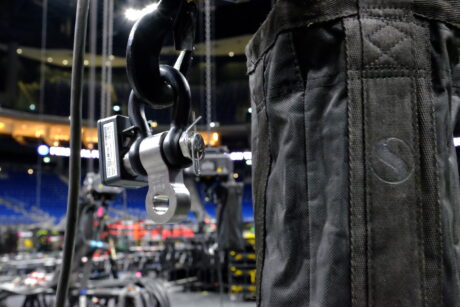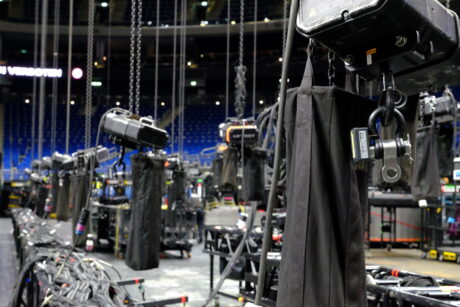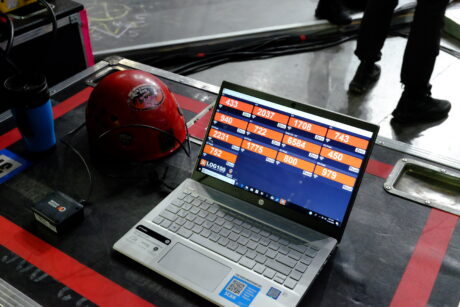 Queen of pop, Madonna kicked off her twelfth concert tour, The Celebration Tour in October 2023 at the O2 Arena in London. With 81 shows on the schedule, visiting cities in North America, Europe, and South America, the tour is due to conclude on May 4, 2024, with a free concert at the Copacabana Beach in Rio de Janeiro, Brazil. This is Madonna’s first retrospective tour, highlighting her more than four decade-long recording career.
Queen of pop, Madonna kicked off her twelfth concert tour, The Celebration Tour in October 2023 at the O2 Arena in London. With 81 shows on the schedule, visiting cities in North America, Europe, and South America, the tour is due to conclude on May 4, 2024, with a free concert at the Copacabana Beach in Rio de Janeiro, Brazil. This is Madonna’s first retrospective tour, highlighting her more than four decade-long recording career.
 With each new city, comes a new venue and to handle the challenges of this tour, Art McConnell of A.M.G. Rigging was contracted as head rigger and also as the overall touring CAD drafter. Art in turn, brought Broadweigh on board to help monitor the loads. Art commented: “I’ve been involved with the Celebration tour from the beginning. As the dancers were in rehearsals, I was gathering information for the venues, working with the creative team on how to draft their vision, creating the overall stage and rigging plot for the tour, and reaching out to individual vendors to confirm what gear they’d be providing. I realized immediately that Broadweigh would be 100% necessary for the tour.”
With each new city, comes a new venue and to handle the challenges of this tour, Art McConnell of A.M.G. Rigging was contracted as head rigger and also as the overall touring CAD drafter. Art in turn, brought Broadweigh on board to help monitor the loads. Art commented: “I’ve been involved with the Celebration tour from the beginning. As the dancers were in rehearsals, I was gathering information for the venues, working with the creative team on how to draft their vision, creating the overall stage and rigging plot for the tour, and reaching out to individual vendors to confirm what gear they’d be providing. I realized immediately that Broadweigh would be 100% necessary for the tour.”
The Celebration Tour weighs in at 164,842 lbs./ 74.7 tons, with 160 points (3 fall arrests, 43 x 2 tons and 114 x 1 tons). It is also extremely complex with 2 x mother grids, 2 x fly racks, and 2 x spreader trusses that trim above the rest of the rig. When the grids are set, the other lighting and automated elements get flown and trimmed underneath the grids and spreaders. Because of the automated elements, Art must monitor the dynamic loads along with the overall static weight of the show.
Art continued; “The stage is also very complex as we have a Main Stage area that is a circle, the SL and SR Runways, and a center runway, all of which have stage lifts. The important thing to keep in mind here, is the stage and the rig have to coincide with one another, always. The stage cannot be off a little from the rig and the rig must be hung in the correct place over the stage. All of this is a part of my mark-out and why I take such care when doing the overlays into each of these venues. Using Broadweigh on each leg of the tour give me one thing less to worry about.”
Art uses Broadweigh to weigh the show as a whole. The best weight estimations go into the rigging plot when first planning the show, all before technical rehearsals. Art totals up all the show elements, based on the information received from each of the vendors, to the best of his ability. Then, once in rehearsals he can read what each point actually weighs, and with these documented weights, he is able to go back and accurately update the rigging plot to be sent out to the venues and engineers. But, as he explains, this isn’t the only benefit of Broadweigh on the Madonna tour.

“I love being able to use the load cells to monitor the dynamic loads. When the mirror ball moves up and down, I can read that added movement, document that extra weight, and explain what the mirror ball move does to the weights if ever I am asked. The same applies to the shifting weight of our fly track. I can see clearly how the weight moves along the points when our gantry travels in whatever direction. And finally, during load in, as trusses get trimmed and levelled, I can read how the truss weight is distributed among the hoist holding that particular truss. If one point ends up heavier than the next, I can balance it out on the motor control to make sure that I don’t overload a hoist, truss, or certain beam in the arena’s rigging grid.”
As each venue differs, Art finds that Broadweigh really helps to manage the changes – from using the cells in rehearsals to create the plot, he is then able to overlay the show in the venues and, if the venue or local engineer has any questions, Art is able to share his documented proof of loads. “Of course, I understand that each venue and each engineer have different demands. Some are ok with how the show will work in their venue, while others have lots of questions. Broadweigh helps explain it all clearly and concisely.
With the eyes of the world on this tour, getting things wrong is not an option. By monitoring the rig the team can avoid any potential accidents from happening. For example: If someone is levelling a truss to an arena floor and the arena floor isn’t actually level then the truss isn’t level. Or if a hoist loses power, while in the air, and causes a truss to be uneven, Art would then check the readings on the cells for these trusses to fix the problem at hand.
 So, what made Art choose Broadweigh over other load cells on the market? “They have so many benefits,” he said. “The cells are weatherproof and sturdy. Load-ins and outs can be best described as organized chaos so it’s vital I have a product that can handle the day-to-day grind of touring life. Being wireless is also a huge bonus – less work when loading in and out, the signal is great and the cells consistently work. I also like the 2 options of reading the cells in the LOG100 program. The All Channel is simple and reacts well when the cells are active, the visual display and being able to write formulas to read the individual cells over a personalized PDF of the show is what sold me. And I also like the ability to program Cell Ids, Point Weights, Truss Weights, added texts, and hoist weight percentages, all on Log 100, to my liking. And lastly, I like being able to personally reach out to the Broadweigh team when I have questions or want to share information.”
So, what made Art choose Broadweigh over other load cells on the market? “They have so many benefits,” he said. “The cells are weatherproof and sturdy. Load-ins and outs can be best described as organized chaos so it’s vital I have a product that can handle the day-to-day grind of touring life. Being wireless is also a huge bonus – less work when loading in and out, the signal is great and the cells consistently work. I also like the 2 options of reading the cells in the LOG100 program. The All Channel is simple and reacts well when the cells are active, the visual display and being able to write formulas to read the individual cells over a personalized PDF of the show is what sold me. And I also like the ability to program Cell Ids, Point Weights, Truss Weights, added texts, and hoist weight percentages, all on Log 100, to my liking. And lastly, I like being able to personally reach out to the Broadweigh team when I have questions or want to share information.”
He concluded: “We finish the tour in May with a massive concert on Copacabana Beach which is set to draw an audience of up to 1 million! Broadweigh will be put to the test for that event too – the Queen of Pop deserves the king of load cells, and that’s Broadweigh.”


